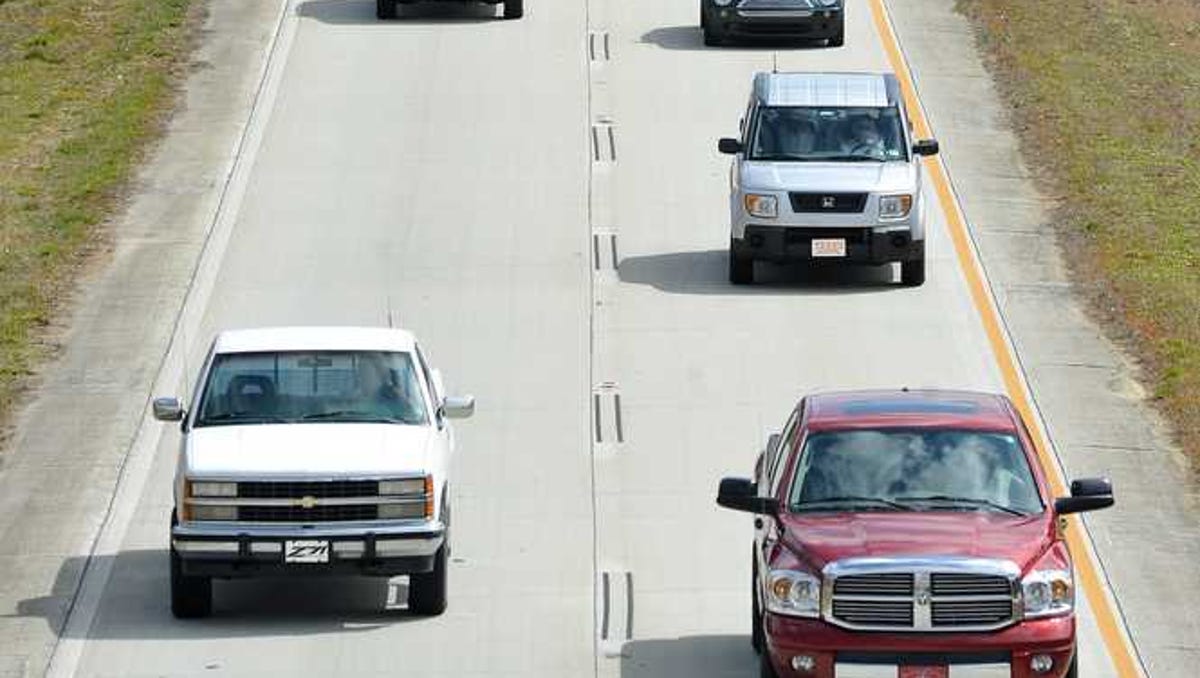Georgia
A major roadway connecting Athens and Atlanta may see changes. DOT seeks public input

The Georgia Department of Transportation is hosting a public hearing to release information on major changes planned for Georgia Highway 316.
The hearing, scheduled for April 23 in Statham, is geared at presenting the findings of a study and to gather community feedback.
The nearly 40-mile highway links metro Atlanta to the Athens Perimeter, making it the most highly traveled highway corridor between the capitol city and the state’s flagship university town.
The hearing is planned for 4:30-6:30 p.m. in the Statham Community Center at 336 Jefferson St. A formal presentation is not planned for the meeting.
The study, according to DOT, is an examination of the 40-mile section of the highway from I-85 in Atlanta to the Oconee Connector in Oconee County.
“The study’s initial analysis showed that approximately 65 percent of the 40-mile corridor experiences crash rates higher than the statewide average,” according to a release from DOT.
The study, which began in 2022, is due to conclude this fall. The DOT report noted the changes based on safety, reducing congestion and supporting economic development.
The first five miles of the highway in the Atlanta area is considered a freeway, but the DOT reports it could be extended as a freeway from Buford Drive in Gwinnett County to the Athens Perimeter in Oconee County.
Highway 316: DOT: Improvements coming to Georgia 316 between, including in Oconee County
316 Development: ‘A very special project’: Tract near Athens envisioned as huge research/business hub
The study shows that accidents on the freeway sections are lower than similar highways in the state, while the number of accidents on the non-freeway portion is higher than similar roadways.
In the most recent fatal wreck, three people were killed at the State Route 11 intersection between Bethlehem and Winder, where major overpass construction is currently underway.
In 2021, Gov. Brian Kemp and the DOT announced a $828.8 million project to perform reconstruction projects at intersections.
The goal of the study is to find ways to find intersection and operations improvements to enhance safety.
“Our goal is not only to share information, but also to obtain the community’s input, which we can potentially incorporate into the study’s proposed final recommendations,” according to Jomar Pastorelle, the DOT project manager for the study.
A survey can be accessed at State Route 316 – Survey 2

Georgia
Q&A: Georgia Tech dean details why the school needed a new AI supercomputer

Tell me about the Makerspace project and how it came to be? “The Makerspace is really the vision of our dean, Raheem Beyah, and the school chair of Electrical and Computer Engineering (ECE), Arijit Raychowdhury, who really wanted to put AI in the hands of our students.
“In 2024 — in the post ChatGPT world — things are very different from the pre-ChatGPT world. We need a lot of computing power to do anything that’s meaningful and relevant to industry. And in a way, the devil is out of the box. People see what AI can do. But I think to get to that level of training, you need infrastructure.
Makerspace’s Nvidia H100 Tensor Core GPUs
Georgia Tech College of Engineering
“The name Makerspace also comes from this culture we have at Georgia Tech of these maker spaces, which are places where our students get to tinker, both within the classroom and outside the classroom. The Makerspace was the idea to bring the tools that you need to do AI in a way that’s relevant to do meaningful things today. So, right now, where we’re at is we’ve partnered Nvidia to essentially offer to students a supercomputer. I mean, that’s what it is.
“What makes it unique is that it’s meant for supporting students. And right now it’s in the classroom. We’re still rolling it out. We’re in phase one. So, the idea is that the students in the classroom can work on AI projects that are meaningful to industry — problems that are interesting, you know, from a pedagogical perspective, but they don’t mean a whole lot in an industry setting.”
Tell me a bit about the projects they’ve been working on with this. “I can give you a very concrete example. ChatGPT is a very typical, a very specific form of AI called generative AI. You know, it’s able to generate. In the case of ChatGPT, [that means] text in response to prompts. You might have seen a generative model that generates pictures. I think these were very popular and whatnot. And so these are the kind of things our students can do right now, …generate anything that would be, say, photo realistic.
“You need a pretty hefty computing power to train your model and then test that it’s working properly. And so that’s what our students can do. Just to give you an idea of how far we’ve come along, before we had the AI Makerspace, our students were relying largely on something called Google CoLab. CoLab is Google making some compute resources freely accessible for use. They’re really giving to us the resources they don’t use or don’t sell to their be clients. So it’s like the crumbs that remain.
Georgia
Georgia at Political Crossroads as 'Foreign Agent' Bill Draws Protests
Georgia
Early in-person voting begins ahead of Georgia's May 21 primary and judicial elections
ATLANTA (AP) — Georgia voters are beginning to have their say on party primary races and nonpartisan judicial elections.
Three weeks of early in-person voting is set to begin Monday ahead of the May 21 election, when parties will choose their nominees for congressional and state legislative seats, as well as for local races including sheriffs, district attorneys and county commissioners.
May 21 also is the general election for judicial candidates, who run on a nonpartisan basis.
Mail-in ballots were sent last week to those who had requested them, while people can continue to request a mail ballot through May 10.
Among the top races are a state supreme court race between incumbent Justice Andrew Pinson and challenger John Barrow and primaries in the 3rd Congressional District, where incumbent Republican U.S. Rep. Drew Ferguson is stepping down.
Runoffs will be held June 18 in races where candidates don’t win a majority in May.
Here’s a look at the election and some top races:
CONGRESSIONAL SHOWDOWN
Six Republicans are seeking their party’s nomination to succeed Ferguson in a district that runs along the Alabama border from Carrollton to Columbus and swings east into the Atlanta suburbs around Peachtree City and Fayetteville.
Former President Donald Trump has endorsed his onetime aide Brian Jack for the seat. Also seeking the nomination are former state Sens. Mike Crane and Mike Dugan, former state Rep. Philip Singleton, Jim Bennett and Ray Blair.
On the Democratic side, Val Almonord and Maura Keller are seeking their party’s nomination in the heavily GOP district.
STATE SUPREME COURT
The May 21 vote is the general election for judicial candidates, who run without party labels.
Incumbent Justice Andrew Pinson, who was appointed to the court by Gov. Brian Kemp in 2022, is trying to win a six-year term. He is opposed by John Barrow, a former Democratic congressman. Barrow says he believes Georgians have a right to abortion under the state constitution, while Pinson says it’s inappropriate for him to talk about issues and important not to make the race partisan.
Justices Michael Boggs, John Ellington and Nels Peterson are unopposed. Six judges on the Georgia Court of Appeals are also unopposed, while Jeff Davis and Tabitha Ponder are contending for an open seat on that intermediate court of appeal.
OTHER CONGRESSIONAL RACES
Incumbent U.S. Reps. Lucy McBath and David Scott, both Democrats, face challengers from their own party in redrawn districts.
Scott faces six challengers in the 13th District in Atlanta’s southern and eastern suburbs. They include former East Point City Council member Karen René, former South Fulton City Council member Mark Baker and attorney Brian Johnson. On the Republican side, Jonathan Chavez is running against Johsie Fletcher.
U.S. Rep. Lucy McBath has jumped from the 7th District to run in the 6th District, on the western side of metro Atlanta. She’s being challenged by fellow Democrats Mandisha Thomas, a state representative, and Jerica Richardson, a Cobb County commissioner.
LOCAL RACES
Fulton County District Attorney Fani Willis, in the national spotlight for her prosecution of former President Trump and others, faces attorney Christian Wise Smith in the Democratic primary. Fulton County Superior Court Judge Scott McAfee, who is presiding in the same case, is being challenged by lawyer and talk show host Robert Patillo. Lawyer Tiffani Johnson was disqualified from challenging McAfee.
WHAT WILL TURNOUT BE LIKE?
While 5 million or more Georgians could vote in November’s presidential election, history suggests many fewer people will vote in the primary.
In 2016, the last time the state primaries didn’t coincide with the presidential primary, only one-fifth as many people voted in May as in the presidential general election in November. With few hotly contested congressional primaries, races for county offices may be what bring voters to the polls in some parts of Georgia.
-

 Kentucky1 week ago
Kentucky1 week agoKentucky first lady visits Fort Knox schools in honor of Month of the Military Child
-

 News1 week ago
News1 week agoIs this fictitious civil war closer to reality than we think? : Consider This from NPR
-

 World1 week ago
World1 week agoShipping firms plead for UN help amid escalating Middle East conflict
-

 Politics1 week ago
Politics1 week agoICE chief says this foreign adversary isn’t taking back its illegal immigrants
-

 Politics1 week ago
Politics1 week ago'Nothing more backwards' than US funding Ukraine border security but not our own, conservatives say
-

 News1 week ago
News1 week agoThe San Francisco Zoo will receive a pair of pandas from China
-

 World1 week ago
World1 week agoTwo Mexican mayoral contenders found dead on same day
-

 Politics1 week ago
Politics1 week agoRepublican aims to break decades long Senate election losing streak in this blue state




















